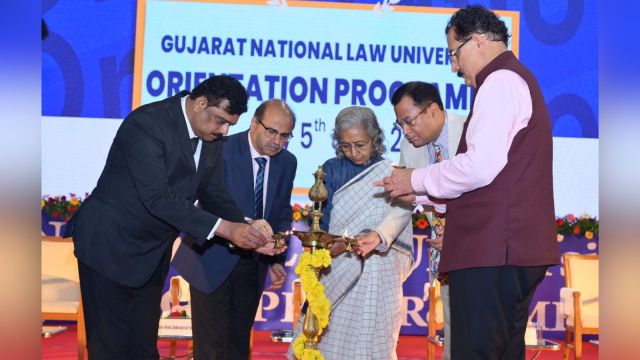HC judges’ advice to law students: Treat courtroom as classroom, focus on building character
Gujarat High Court's Justice Ilesh Vora and Rajasthan HC Judge Justice Sameer Jain speak to students at the orientation programme of the Gujarat National Law University.
 Leading high court judges spoke at the two-day orientation programme at the Gujarat National Law University. (Express Photo)
Leading high court judges spoke at the two-day orientation programme at the Gujarat National Law University. (Express Photo)Two leading high court judges advised students of law on how to chart their course by treating the “courtroom as a classroom” and focus on building “character”, while speaking at the two-day orientation programme at the Gujarat National Law University (GNLU) that began on Saturday.
Rajasthan High Court Judge, Justice Sameer Jain, spoke about bridging the gap between academic learning and courtroom reality. “However well you may write your research papers or exams, you cannot learn court craft solely from textbooks. The courtroom is your real classroom,” he asserted.
According to Justice Jain, legal education was not just about mastering statues, procedures and precedents but also about “cultivating emotional resilience, ethical values, a sense of public responsibility and a balanced mind”.
He said courts needed fresh talent, “those who can argue with integrity, think critically, and uphold constitutional values”, and urged law graduates to become employers, legal entrepreneurs and policy innovators, not merely “job seekers”.
Gujarat High Court’s Justice Ilesh Vora reminded students that law is a profession grounded in character. “Character matters more than intellect and efficiency. Clients, judges, and society at large will place their faith in you, not just because you are knowledgeable but because you are trustworthy,” he said.
He advised students not to limit themselves to textbooks or bare acts but to expand their maturity by reading history, literature and philosophy, which would “change mindsets and thought process”.
Retired Gujarat HC chief justice Sonia Gokani was also present on the occasion.
Congratulating the students for securing admission through the highly competitive CLAT, GNLU Director, Prof (Dr) S Shanthakumar said, “The study of law is not merely the study of rules; it is the study of the very architecture of our society. You are here not just to learn the law as it is, but to question it, challenge it, and ultimately shape it for the better.” He emphasised that resilience, empathy, and a commitment to justice are qualities that define a successful legal professional.












